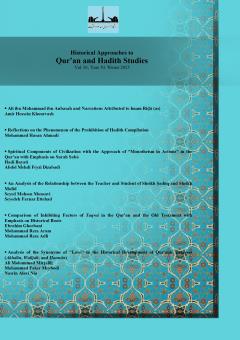Spiritual Components of Civilization with the Approach of “Monotheism in Actions” in the Qur’an with Emphasis on Surah Sabá
Subject Areas : -
Hadi Bayati
1
*
,
Abdol Mehdi Feyzi Dizabadi
2
![]()
1 - Assistant Professor of History, Department of Islamic Studies, University of Mazandaran, Babolsar, Iran (corresponding author).
2 - Ph.D. in Islamic History, Culture, and Civilization Teaching, Shahid Beheshti University, Tehran, Iran
Keywords: Surah Sabá, Monotheism in Actions, Components and Factors of Civilization.,
Abstract :
Given that human societies have been pursuing civilization in the sense of interpersonal behavior between humans and nature in their societies for centuries, but in the course of civilizational development and despite the accumulation of experiences and sciences, they have never been able to achieve it completely and flawlessly, and this indicates the shortcomings and gaps in those accumulations. This research aims to address the above issue with a descriptive-analytical method, relying on the semantics and structural interpretation of the verses and the author-centered hermeneutic approach, and to answer the main question: what are the spiritual components of civilization with respect to Surah Sabá? The results of the research indicate that Islam, with the approach of monotheism in actions with respect to Surah Sabá, completes the secular civilizational component and drivers and also strives to introduce some components. The fact that Islam is ahead of the West in expressing civilizational components is an expression of its position and applicability in the civilizational sphere of society. To the extent that the worldview of the Monotheism in Actions grows in society, considering its effects, society will witness the dynamism and movement of civilization-building.
قرآن کریم.
1. ابن عاشور، محمد بن طاهر،( 1984ق)، التحرير و التنوير، ج22، تونس: الدار التونسية للنشر.
2. بابایی، حبیب الله، (1396)، «شاخصهای تمدنی (در دو رویکرد عرفی و قدسی)»، دو فصلنامه پژوهشهای تمدن نوین اسلامی، س 1، ش 2، تابستان.
3. بابایی، حبیب اله، فاطمه مرادی،(1400)، «فرایند تکوین خیر کبیر»، دو فصلنامه علمی مطالعات بنیادین تمدن نوین اسلامی، دوره 4، ش 1، بهار و تابستان.
4. بابایی، حبیب اله،(1396)، «تنوع اسلامی در فرایند تمدنی»، فصلنامه نقد و نظر، س 22، ش 88، تابستان.
5. بابایی، حبیباله،( 1393)، کاوشهای نظری در الهیات و تمدن، قم ، ناشر: پژوهشگاه علوم و فرهنگ اسلامی.
6. راغب اصفهانی، حسین بن محمد،( 1383)، المفردات في غريب القرآن، ترجمه غلامرضا خسروی حسینی، ج2، تهران: المکتب المرتضویه لاحیاء الآثار الجعفریه.
7. سبحانی، جعفر، (1353)، خاتمیت از دیدگاه عقل و قرآن، ترجمه استادی، رضا، تهران: دارالکتب الاسلامیه.
8. صادق زاده، علیرضا، مریم بناهان، (1391)، «رویکرد تربیتی به آیات انذار و تبشیر»، فصلنامه پژوهش در مسائل تعلیم و تربیت اسلامی، س 20، ش 14، بهار.
9. صدر، سید محمد باقر،( 1369)، سنت¬های تاریخ و فلسفه اجتماعی در مکتب قرآن، ترجمه منوچهری، حسین، تهران: فرهنگ رجاء.
10. طباطبایی، محمد حسین، (1374)، تفسیر المیزان، ترجمه موسوى همدانى سيد محمد باقر، ج1، 20، قم: انتشارات اسلامى جامعه مدرسين حوزه علميه قم.
11. طبرسی، فضل بن حسن،( 1377)، ترجمه جوامع الجامع، مترجمان، ج5، مشهد: بنياد پژوهشهاى اسلامى آستان قدس رضوى.
12. عاملی، شیخ حر، (1409)، وسائل الشیعة، ج15، قم: مؤسسه آل البيت عليهمالسلام.
13. فخرالدين رازى، ابوعبدالله محمد بن عمر، (1420)، مفاتيح الغيب، ج 21، بیروت: دار احياء التراث العربى.
14. کلینی، محمد بن یعقوب،(1407ق)، الكافي، ج1، تهران: دارالکتاب الاسلامیه.
15. لک زایی، نجف،( 1394)، تاریخ فرهنگی سیاسی ایران معاصر، قم: هاجر.
16. محدث نورى،( 1408)، مستدرك الوسائل، ج1، قم: مؤسسه آل البيت عليهم السلام.
17. مصباح، محمد تقی، (1389)، معارف قرآن راهنماشناسی، ج5، قم: مؤسسه آموزشی و پژوهشی امام خمینی.
18. مطهرى، مرتضی، (1372)، انسان و سرنوشت، تهران: صدرا.
19. مطهرى، مرتضی، (1385)، مجموعه آثار، ج3، تهران: صدرا.
20. مکارم شیرازی، ناصر، ( 1374)، تفسیر نمونه، ج 18، تهران: دار الكتب الإسلامية.

